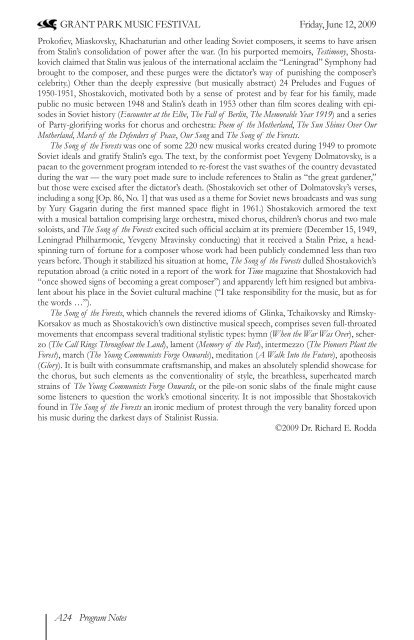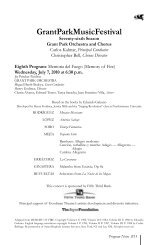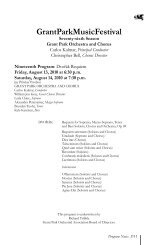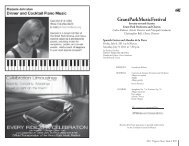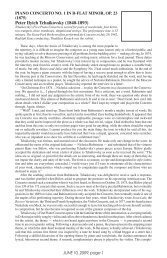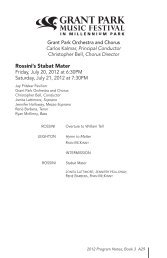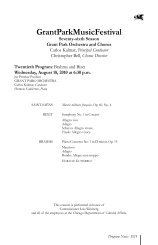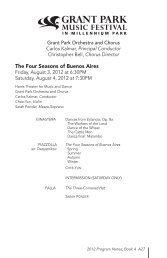Program Notes PDF - The Grant Park Music Festival
Program Notes PDF - The Grant Park Music Festival
Program Notes PDF - The Grant Park Music Festival
Create successful ePaper yourself
Turn your PDF publications into a flip-book with our unique Google optimized e-Paper software.
GRANT PARK MUSIC FESTIVAL Friday, June 12, 2009<br />
Prokofiev, Miaskovsky, Khachaturian and other leading Soviet composers, it seems to have arisen<br />
from Stalin’s consolidation of power after the war. (In his purported memoirs, Testimony, Shostakovich<br />
claimed that Stalin was jealous of the international acclaim the “Leningrad” Symphony had<br />
brought to the composer, and these purges were the dictator’s way of punishing the composer’s<br />
celebrity.) Other than the deeply expressive (but musically abstract) 24 Preludes and Fugues of<br />
1950-1951, Shostakovich, motivated both by a sense of protest and by fear for his family, made<br />
public no music between 1948 and Stalin’s death in 1953 other than film scores dealing with episodes<br />
in Soviet history (Encounter at the Elbe, <strong>The</strong> Fall of Berlin, <strong>The</strong> Memorable Year 1919) and a series<br />
of Party-glorifying works for chorus and orchestra: Poem of the Motherland, <strong>The</strong> Sun Shines Over Our<br />
Motherland, March of the Defenders of Peace, Our Song and <strong>The</strong> Song of the Forests.<br />
<strong>The</strong> Song of the Forests was one of some 220 new musical works created during 1949 to promote<br />
Soviet ideals and gratify Stalin’s ego. <strong>The</strong> text, by the conformist poet Yevgeny Dolmatovsky, is a<br />
paean to the government program intended to re-forest the vast swathes of the country devastated<br />
during the war — the wary poet made sure to include references to Stalin as “the great gardener,”<br />
but those were excised after the dictator’s death. (Shostakovich set other of Dolmatovsky’s verses,<br />
including a song [Op. 86, No. 1] that was used as a theme for Soviet news broadcasts and was sung<br />
by Yury Gagarin during the first manned space flight in 1961.) Shostakovich armored the text<br />
with a musical battalion comprising large orchestra, mixed chorus, children’s chorus and two male<br />
soloists, and <strong>The</strong> Song of the Forests excited such official acclaim at its premiere (December 15, 1949,<br />
Leningrad Philharmonic, Yevgeny Mravinsky conducting) that it received a Stalin Prize, a headspinning<br />
turn of fortune for a composer whose work had been publicly condemned less than two<br />
years before. Though it stabilized his situation at home, <strong>The</strong> Song of the Forests dulled Shostakovich’s<br />
reputation abroad (a critic noted in a report of the work for Time magazine that Shostakovich had<br />
“once showed signs of becoming a great composer”) and apparently left him resigned but ambivalent<br />
about his place in the Soviet cultural machine (“I take responsibility for the music, but as for<br />
the words …”).<br />
<strong>The</strong> Song of the Forests, which channels the revered idioms of Glinka, Tchaikovsky and Rimsky-<br />
Korsakov as much as Shostakovich’s own distinctive musical speech, comprises seven full-throated<br />
movements that encompass several traditional stylistic types: hymn (When the War Was Over), scherzo<br />
(<strong>The</strong> Call Rings Throughout the Land), lament (Memory of the Past), intermezzo (<strong>The</strong> Pioneers Plant the<br />
Forest), march (<strong>The</strong> Young Communists Forge Onwards), meditation (A Walk Into the Future), apotheosis<br />
(Glory). It is built with consummate craftsmanship, and makes an absolutely splendid showcase for<br />
the chorus, but such elements as the conventionality of style, the breathless, superheated march<br />
strains of <strong>The</strong> Young Communists Forge Onwards, or the pile-on sonic slabs of the finale might cause<br />
some listeners to question the work’s emotional sincerity. It is not impossible that Shostakovich<br />
found in <strong>The</strong> Song of the Forests an ironic medium of protest through the very banality forced upon<br />
his music during the darkest days of Stalinist Russia.<br />
©2009 Dr. Richard E. Rodda<br />
A24 <strong>Program</strong> <strong>Notes</strong>


